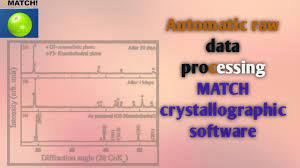MATCH is a
crystallographic software package used for solving and refining crystal
structures. To automatically process raw data in MATCH, you can use the
built-in tools and scripts that come with the software.
Here are some general steps you can follow to process raw data in MATCH:
- Import the raw data into MATCH using
the appropriate format. MATCH supports several file formats for raw data,
including CIF, SHELX, and XDS.
- Use the MATCH processing tools to
preprocess the raw data, such as scaling, merging, and filtering. MATCH
has a number of built-in tools for data preprocessing, such as the
"MatchRefine" module and the "MatchSolve" module.
- Use the MATCH structure solution
tools to solve the crystal structure from the preprocessed data. MATCH has
several modules for structure solution, including the
"ChargeFlip" module and the "TwinRotMat" module.
- Refine the crystal structure using
the MATCH refinement tools. MATCH includes several modules for refinement,
including "MatchRefine" and "FreeR".
- Validate the final crystal structure
using the MATCH validation tools, which include the
"MatchValidate" module and the "Platon" module.
It's worth noting that the specific steps and tools used for raw data processing in MATCH may vary depending on the specific data and the requirements of the project. It's always a good idea to consult the MATCH documentation and seek advice from experienced crystallographers to ensure that you are using the appropriate tools and procedures for your specific project.




0 Comments